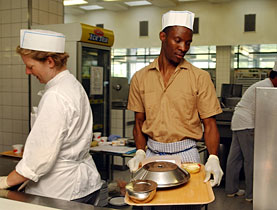
Experts highlight migrant contribution

To mark United Nations International Migrants Day, organisations are calling for migrants' rights to be better protected and their contribution to society recognised.
In Switzerland migration is mainly of an economic nature, and experts agree that without it the Swiss economy and culture would be a lot poorer.
The UN General Assembly decreed in 2000 that International Migrants Day should be held every year on December 18.
UN Human Rights Commissioner Louise Arbour said that migrants were one of the groups whose rights were most ignored and that many suffered discrimination.
Arbour called for all governments to ratify the UN convention on migrants, which came into force in July 2003. Switzerland has not yet ratified this text.
The European Union also urged nations to improve migrants’ rights. EU Commissioner for Human Rights Thomas Hammarberg criticised “anti-foreigner expressions” in some countries.
He added that the ageing continent needed more migration.
Fifth of population
According to the Federal Migration Office, there are currently 1.5 million foreigners in Switzerland, or 20.6 per cent of the population.
“Migration is certainly important for economic growth,” said Migration Office spokesman Jonas Montani.
“[It ensures] the economy gets the people it needs and that companies in Switzerland or firms thinking of setting up in Switzerland also get the people they need. This makes Switzerland an attractive location,” he told swissinfo.
The most numerous groups of foreigners came from Italy, Germany and Serbia.
Since June 1, 2007 citizens from the “old” 15 members of the EU as well as Malta and Cyprus, have also benefited thanks to a bilateral accord with Switzerland for the full free movement of people.
Many EU workers are highly qualified; others work in the building or catering industry.
The ten “new” EU members, mostly from the former Eastern bloc, as well as non-EU and European Free Trade Association states, are still subject to quotas, added Montani.
Switzerland also accepts asylum seekers and refugees.
Foreigners’ image
However, the country sometimes has an uneasy relationship with its foreign population. A survey on Monday found that foreigners were number four on Swiss voters’ list of worries.
A group of non-governmental organisations in the French-speaking part of Switzerland launched a campaign ahead of International Migrants Day, aimed at boosting the image of foreigners.
“We hope that with the ousting of [rightwing Justice Minister] Christoph Blocher from the cabinet Switzerland will find its way back to its traditions of hospitality and respect for foreigners living there,” said Paul Kahumbu Ntumba, president of the Foreigners Forum in Lausanne (FEEL).
Blocher – the People’s Party leading light – was voted out of the cabinet by parliament last Wednesday.
For his part, Philippe Wanner, a demographer at Geneva University, says that without foreigners Switzerland would have a “unilateral and poor world view”.
“Our national football team would not work so well. Our universities would have to close their doors and our hospitals would lose 50 per cent of their capacity,” he told swissinfo.
swissinfo
As of August 2007, there were 1.5 million foreigners in Switzerland, of which 933,099 were from the European Union and the European Free Trade Association (Efta) zone.
According to the Federal Migration Office, the number of EU/Efta foreigners rose by 3.2 per cent after the free movement of people accord came into force in June this year. Germans are the fastest growing migrant population.
The number of people from outside these countries decreased by 1.1 per cent. The Migration Office says this is because the new law on foreigners, approved by voters last year, limits immigration from outside the EU and Efta to highly skilled workers.

In compliance with the JTI standards
More: SWI swissinfo.ch certified by the Journalism Trust Initiative




























You can find an overview of ongoing debates with our journalists here . Please join us!
If you want to start a conversation about a topic raised in this article or want to report factual errors, email us at english@swissinfo.ch.